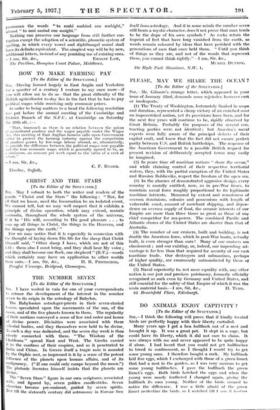PLEASE, MAY WE SHARE THE OCEAN?
[To the Editor of the SPECTATOR.]
Sin,—Mr. Gilmore's strange letter, which appeared in your issue of January 22nd, demands some rejoinder, however curt or inadequate.
(1) The Treaty of Washington, fortunately limited in scope and duration, represented a cheap victory of an enriched over an impoverished nation, yet its provisions have been, and for the next five' years will continue to be, rigidly observed by Great Britain. Probably the purposes of the several con- tracting parties were not identical ; but America's naval experts were fully aware of the principal defects of their capital craft, and knew that the fact did not ensure perfect panty between U.S. and British battleships. The response of the American Government to a possible British request for present revision of deliberately accepted terms may easily be imagined.
(2) In peace time all maritime nations "share the ocean," and while claiming control of their respective territorial waters, they, with the partial exception of the United States and Russian Bolsheviks, respect the freedom of the open sea.
(3) In the absence of demonstrated aggresivc design, every country is morally entitled, now, as in pre-War times, to maintain naval force roughly proportional to its legitimate maritime interests. Measured by extent and remoteness of oversea dominions, colonies and possessions with length of vulnerable coast, amount of merchant shipping, and depen- dence on oversea supply of food, the oceanic interests of our Empire are more than three times as great as those of oiir chief competitor for sea-power. The combined Pacific and Atlantic shores of the United States arc shorter than that of Australia.
' (4) The number of our cruisers, built and building, is not double the American force, which in post-War boats, actually built, is even stronger than ours Many of our cruisers are obsolescent ; and our existing, or, indeed, our impending ad- vantage is far less than that required for security of our vast maritime trade. Our destroyers and submarines, perhaps of higher quality, are enormously outnumbered by those of the United States.
(5) Naval superiority to, not mere equality with, any other nation is our just and precious patrimony, formerly officially recognized as such even by Germany and United States, and still essential for the safety of that Empire of which it was the main material basis.—I am, Sir, &e., H. 'PERO. 82 Bruntsfield Place, Edinburgh.


























































 Previous page
Previous page